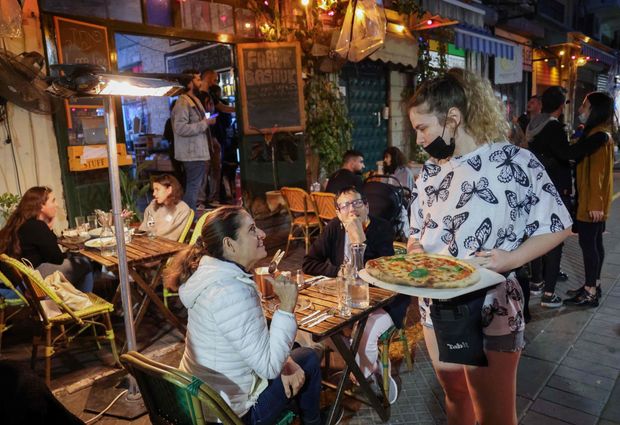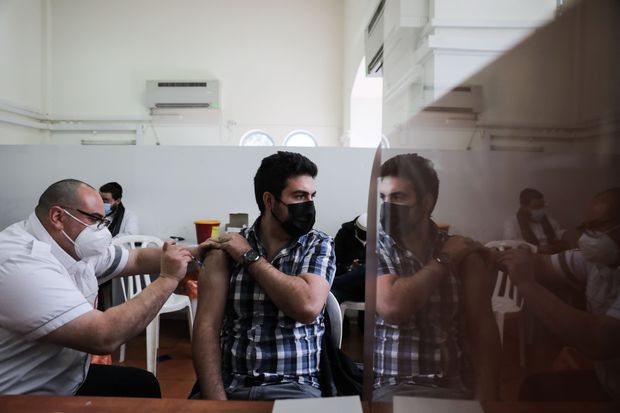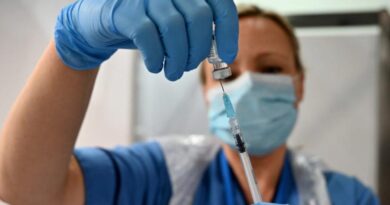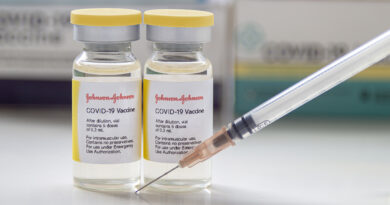Israel’s First Covid-19 Vaccinations Were Easy. Now Comes the Hard Part.
TEL AVIV—Across the street from a bar packed with newly inoculated Israelis, a crowd gathered on a recent Tuesday to protest against government pressure to take the vaccine, and the perks it extends to the vaccinated.
Over the blare of techno music, many of the antivax protesters wore stickers that read “No to forced vaccination” and complained that only they can decide what to do with their bodies. Their chief grievance: the so-called green passport, issued by the government, which allows those who have had both shots of the vaccine to enter bars, gyms and restaurants.
STAY INFORMED
Get a coronavirus briefing six days a week, and a weekly Health newsletter once the crisis abates: Sign up here.
“I’m healthy, my body knows how to overcome,” said Tamir Hefetz, 46, one of the organizers of the antivaccine demonstration. “The green passport is something terrible.”
In the late stages of its vaccination drive, Israel is trying to persuade holdouts to get vaccinated before new variants of the coronavirus raise infection levels again, causing further damage to the country’s economy.
But the hardened pockets of resistance the Israeli government faces point to the struggles that await many Western countries, including the U.S., once they have inoculated much of their populations.
“The further you go the more difficult it becomes,” Israel’s Health Minister Yuli Edelstein said in an interview. “It’s exactly like running a marathon.”

Only people who have had both shots of the Covid-19 vaccine are allowed to enter restaurants in Tel Aviv, Israel.
Photo: emmanuel dunand/Agence France-Presse/Getty Images
With more than 55% of its population receiving at least one shot—and more than 46% with two—Israel’s vaccine campaign has reached a critical stage. After peaking at more than 230,000 shots a day in mid-January, the vaccine rollout has slowed in recent weeks to about 100,000 a day.
Experts warn that if Israel is to reach some level of immunity and detection that will allow it to exit repeated cycles of economic openings and lockdowns, that pace needs to accelerate.
Gili Regev, director of Sheba Medical Center’s epidemiology division, said Israel won’t reach herd immunity with the British variant until 80% of the population is vaccinated, currently impossible until children under 16 can take the shot. Before then, she said, only inoculating as many people as possible over 16 will improve the outlook.
“The more people who get vaccinated, the safer it is for everybody,” she said.
Dr. Regev estimates that only around 4% of Israelis who are offered a vaccine refuse it, but there are many others who haven’t bothered to get the shot, despite individual cities setting up mobile inoculation sites and public awareness campaigns. Israel’s government has also developed an elaborate incentive system, based around the green passports, that allows vaccinated people to access fitness, dining and entertainment options mostly sealed off during successive lockdowns and which are still largely closed to the unvaccinated.

Israel’s pro-vaccine campaign is swaying some holdouts, such as at this downtown Jerusalem vaccination center on March 9.
Photo: abir sultan/Shutterstock
Since the beginning of the vaccine campaign, Israel’s health maintenance organizations have targeted everyone eligible with text messages, phone calls and emails to draw them to vaccination sites.
Such appeals still fall on deaf ears for people such as Katy Drabkin of Holon, a city south of Tel Aviv. She recently biked by a vaccine center in the city, and then urged several individuals in line not to take the shots. She doesn’t trust information from mainstream media about the vaccines, and resents being discriminated against for refusing a shot.
“What’s happening now is that our media belongs to the establishment, which belongs to people with a vested interest,” she said. “So now, they are simply convincing everyone that there is a dangerous pandemic.”
Shiri, 45, who attended the antivaccine demonstration in Tel Aviv but declined to give her last name because she feared repercussions for her business, also doubts a shot is worthwhile. She brought her husband and three children along to pass out the antivaccine stickers to passersby.
“I am not sure that this is safe or working,” she said, referring to the vaccine.
SHARE YOUR THOUGHTS
What more should be done to encourage vaccination? Join the conversation below.
Israel initially fared well during the first wave of the pandemic but experienced a crippling second wave after reopening too quickly over the summer, which forced a second lockdown. The country locked down again in December after the spread of the more contagious British variant of the virus prompted a third wave that was the worst of all. So far more than 6,000 people have died from Covid-19, and the shutdowns have cost the Israeli economy billions of dollars.
The pro-vaccine campaign is swaying some holdouts. Amos Yekutiel of Jerusalem said he had no plans to get vaccinated but did so after passing a vaccination site that had been set up in a neighborhood bar. His friends warning him he couldn’t visit until he was vaccinated pushed the 36-year-old consultant through the door.
More on Israel’s Vaccine Program
“I’m not a conspiracy theorist, I just didn’t think I needed it myself,” he said. Now that he has changed his mind, he is excited to go to restaurants and attend a group dinner. “It gives you more freedom.”
To further sway the skeptical, Israel’s health ministry is also taking aim at misinformation about the vaccines, primarily spread over social media. Health officials are working with Israel’s Justice Ministry to take down false information about the vaccines and are also posting information to debunk vaccine myths.
In Jerusalem, two religious students said that even as many of their friends had urged them not to get the vaccine, they ultimately went ahead after asking volunteer medics and doctors questions about how it works and consulting with their parents.
“[At first] we looked at each other and said ‘of course not,’” said Yaakov Silverman, 21, who was eating an ice cream when a volunteer found him and his friend and suggested he get a vaccine at a nearby bar. “But we asked a couple of questions…and we talked each other up about it and said: ‘Why don’t we just do it?’”
—Dov Lieber in Tel Aviv contributed to this article.
Copyright ©2020 Dow Jones & Company, Inc. All Rights Reserved. 87990cbe856818d5eddac44c7b1cdeb8
*** This article has been archived for your research. The original version from The Wall Street Journal can be found here ***


